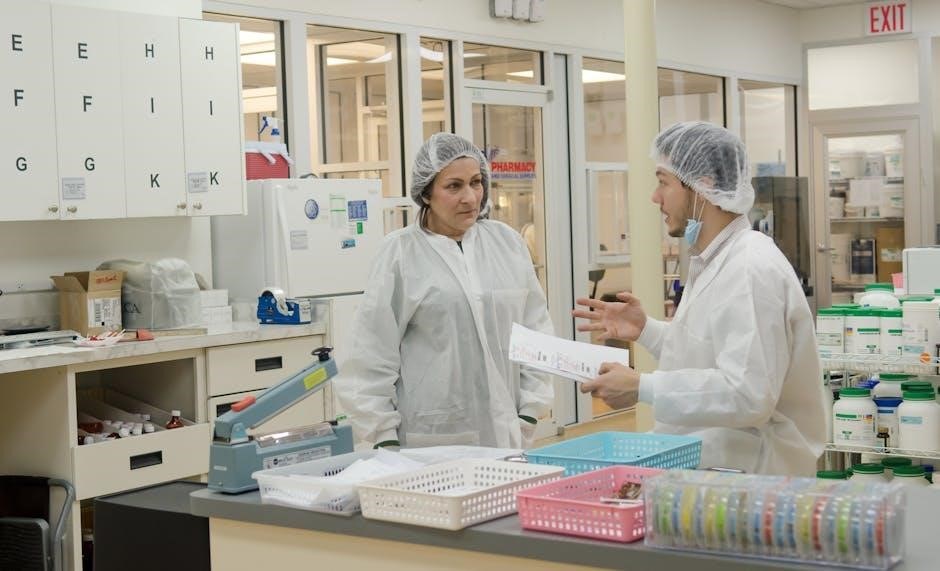licensed clinical social worker exam study guide
The LCSW exam assesses clinical social work skills, ensuring professionals can provide ethical, evidence-based care. Passing it is crucial for advancing in clinical social work practice.
1.1 Overview of the LCSW Exam
The LCSW exam evaluates clinical social workers’ knowledge, skills, and competencies in providing advanced clinical services. Administered by the Association of Social Work Boards (ASWB), it consists of 150 multiple-choice questions, focusing on clinical assessment, diagnosis, treatment, and ethical practice. The exam is designed to ensure professionals can apply evidence-based practices, adhere to legal standards, and demonstrate cultural competence. Candidates typically have two hours to complete the exam. Passing the LCSW exam is a critical step toward obtaining licensure, enabling social workers to independently practice clinical social work. Preparation involves studying key content domains, such as human behavior, psychopathology, and intervention methods, to ensure readiness for the rigorous assessment.
1.2 Importance of Becoming a Licensed Clinical Social Worker
Becoming a Licensed Clinical Social Worker (LCSW) signifies advanced expertise in clinical social work, enabling professionals to address complex mental health issues effectively. This credential opens doors to leadership roles, specialized practice areas, and higher earning potential. LCSWs can work independently, offering therapy, diagnosis, and treatment, which enhances their professional autonomy. The licensure also demonstrates a commitment to ethical practice and evidence-based care, elevating trust with clients and employers. Additionally, it provides opportunities for private practice, expanding career flexibility. Achieving LCSW status is a mark of professional excellence, ensuring social workers can advocate for clients’ well-being more comprehensively while advancing their own career growth and impact in the field.

Exam Structure and Content Domains
The LCSW exam is divided into content domains testing clinical knowledge, assessment, diagnosis, treatment, and professional ethics. It evaluates a candidate’s ability to apply theoretical concepts to real-world scenarios, ensuring competence in clinical social work practice.
2.1 Breakdown of Exam Sections
The LCSW exam is structured into multiple sections, each focusing on specific clinical competencies. The exam typically includes questions on clinical knowledge, assessment, diagnosis, treatment planning, and professional ethics. Candidates are tested on their ability to apply theoretical concepts to real-world scenarios. The exam is divided into content domains, with each section assessing different aspects of clinical social work practice. Understanding the breakdown of exam sections helps candidates focus their study efforts on areas where they need improvement. Each section is designed to evaluate a candidate’s ability to think critically and make sound clinical decisions. Familiarizing oneself with the exam structure is essential for effective preparation and time management during the test.
2.2 Key Content Domains and Topics

The LCSW exam emphasizes several key content domains, including clinical assessment, diagnosis, and treatment. Candidates must demonstrate proficiency in evidence-based practice, cultural competence, and legal/ethical standards. Topics cover human behavior theories, psychopathology, and therapeutic interventions. The exam also focuses on case management, client engagement, and professional development. Understanding these domains is critical for success, as they form the core of clinical social work practice. Effective study requires a deep exploration of each domain, ensuring familiarity with both theoretical concepts and practical applications. Mastery of these topics enables professionals to provide effective, ethical care in diverse clinical settings.

Study Strategies for Success
Evidence-based learning, active recall, and spaced repetition enhance retention. Utilize practice exams, flashcards, and study groups. Incorporate AI tools like ChatGPT for targeted review and concept clarification.
3.1 Creating a Study Plan

A well-structured study plan is essential for success. Start by setting clear, measurable goals aligned with the exam content. Break down the syllabus into manageable sections and allocate specific time frames for each topic. Prioritize challenging areas and schedule regular review sessions. Use a calendar or planner to organize study sessions, ensuring consistency. Incorporate active learning techniques, such as practice questions and flashcards, to reinforce understanding. Allow time for rest and self-care to maintain focus. Regularly assess progress and adjust the plan as needed. Leveraging digital tools, like study apps, can enhance organization and accountability. A structured yet flexible approach ensures comprehensive preparation and reduces exam stress.
3.2 Effective Learning Techniques
Effective learning techniques enhance retention and understanding. Active recall involves testing yourself frequently, which strengthens memory. Spaced repetition helps reinforce information over time. Use flashcards for key terms and concepts. Practice past papers to familiarize yourself with the exam format. Teach the material to others to deepen comprehension. Engage in group discussions to explore different perspectives. Utilize visualization techniques to organize complex information. Record and review study sessions to identify gaps. Incorporate mindfulness practices to reduce stress and improve focus. Prioritize real-world application of concepts to enhance problem-solving skills. Regular exercise and adequate sleep also support cognitive function. Combining these methods creates a holistic approach to learning, ensuring readiness for the LCSW exam.

Recommended Study Resources
Top-rated study guides, practice exams, and online courses are essential for LCSW exam preparation. Utilize resources like Google Scholar and Gemini Deep Research for comprehensive study materials.
4.1 Top-Rated Study Guides and Books
Top-rated study guides and books are indispensable for LCSW exam preparation. Resources like the Clinical Social Work Exam Guide and DSM-5 Desk Reference provide in-depth insights into clinical practices and diagnostic criteria. Google Scholar and Gemini Deep Research offer access to academic articles and synthesized findings, aiding in evidence-based learning. Additionally, textbooks on psychotherapy techniques and ethical standards are crucial for understanding key concepts. These materials are designed to align with the exam’s content domains, ensuring comprehensive coverage of topics. By leveraging these resources, candidates can build a strong foundation for success; Always consult the Association of Social Work Boards (ASWB) website for the most relevant and updated study materials.
4.2 Online Courses and Practice Exams
Online courses and practice exams are powerful tools for LCSW exam preparation. Platforms like Coursera and Udemy offer structured courses that cover clinical assessment, diagnosis, and treatment planning. Practice exams simulate real test conditions, helping candidates familiarize themselves with question formats and timing. Google Scholar and Gemini Deep Research provide access to academic resources and synthesized findings, enhancing evidence-based learning. Additionally, AI-powered tools like ChatGPT can assist with practice questions and concept reviews. Interactive tools and mock exams help identify knowledge gaps, allowing for targeted study. These resources complement traditional study materials, offering a comprehensive and flexible approach to exam preparation. Utilizing these tools can significantly improve confidence and readiness for the LCSW exam.
Test-Taking Tips and Techniques
Arrive early, stay calm, and read questions carefully. Use elimination for multiple-choice and manage time wisely. Practice with mock exams to build confidence and reduce anxiety.

5.1 Managing Exam Anxiety
Exam anxiety can hinder performance, so it’s crucial to address it proactively. Techniques like deep breathing, mindfulness, and positive affirmations help calm the mind. Regular physical exercise and a balanced diet improve focus and reduce stress. A consistent sleep schedule ensures mental sharpness. Visualization of success can boost confidence. Additionally, setting realistic expectations and breaking study sessions into manageable parts prevent overwhelm. Mock exams simulate test conditions, helping you adapt and build resilience. Remember, anxiety is natural, but effective strategies can transform it into a motivator rather than a barrier. Stay grounded, focused, and remind yourself of your preparation and capabilities.
5.2 Strategies for Tackling Multiple-Choice Questions
Mastering multiple-choice questions requires a strategic approach. Start by carefully reading each question and identifying key terms to understand what is being asked. Eliminate clearly incorrect answers first to narrow down your options. If unsure, use the process of elimination to make educated guesses. Trust your initial instincts, as overthinking often leads to second-guessing correct answers. Skim through the exam to answer easier questions first, building confidence and saving time for tougher ones. Time management is critical, so allocate a set amount of time per question. Finally, review your answers briefly before submitting to ensure accuracy. These strategies will help you navigate the exam efficiently and effectively.

Post-Exam Steps
After completing the LCSW exam, candidates receive results, apply for licensure, and pursue ongoing professional development to maintain certification and enhance clinical expertise.
6.1 Understanding Exam Results
Exam results are typically provided within a few weeks, indicating pass or fail. Passing candidates receive a scaled score, while those who fail get diagnostic feedback to improve. Understanding these results is crucial for licensure and professional growth.

6.2 Licensure Application Process
After passing the LCSW exam, candidates must complete the licensure application process, which varies by state. Typically, this involves submitting an application, paying fees, and providing transcripts. Many states require a background check and verification of supervised clinical hours. Some jurisdictions may also require additional documentation, such as letters of recommendation or proof of coursework. It’s essential to check with the state licensing board for specific requirements. Once all materials are submitted, the board reviews the application, and licensure is granted upon approval. This process ensures that professionals meet the necessary standards to practice as licensed clinical social workers independently. Carefully following the steps helps avoid delays and ensures a smooth transition to licensure.
6.3 Maintaining Professional Development

Maintaining professional development is crucial for licensed clinical social workers to stay updated on best practices, ethical standards, and emerging trends. Many states require continuing education hours for licensure renewal, focusing on topics like cultural competence, mental health, and legal issues. Professionals can engage in workshops, online courses, and conferences to fulfill these requirements. Additionally, joining professional associations, such as the National Association of Social Workers (NASW), provides access to resources, networking opportunities, and advocacy support. Staying informed through journals, webinars, and peer discussions ensures ongoing skill development. Continuous learning not only enhances professional growth but also improves service delivery to clients, ensuring ethical and evidence-based practice.
